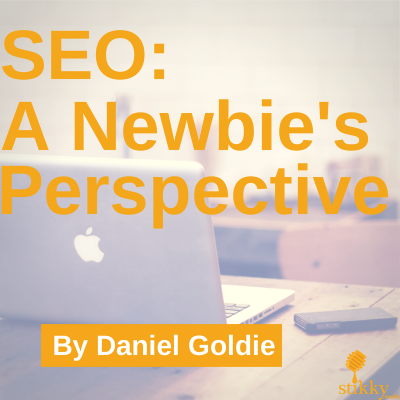
Hi, my name is Daniel. I’m the new intern here at Stikky Media. If you’re like me a few weeks ago, you may have heard the term SEO for the first time. There are so many acronyms in the business world, it can be hard to keep track. ROI, ROE, B2B, RFP, SEO: these are just a few that are slung around the office daily. Unless you know what they all mean, you are left feeling like an alien on a foreign world. Just know you’re not alone – read on for some SEO newbie tips!
You might know that SEO stands for Search Engine Optimization, but what does that actually mean? I sure didn’t know before I started here. For my interview, I did some basic research on the terms that I would be working with, but that didn’t prepare me for the sheer depth that is behind SEO. I’m still wrapping my head around how it works and what it touches. (Here’s a hint: Everything).
We’ve already established that SEO stands for Search Engine Optimization, which at its very core means to work within the rules that search engines establish to get an edge over your competitors online. This can be as simple as creating great content to build your site’s popularity with your target market. In fact, if you read nothing else, this is perhaps top among my SEO newbie tips.
“If you build it, they will come…” but not on the internet. Like with any business, you can have the best product or service in the world, but a lot of good that will do for you if nobody knows you’re there. SEO is the way to make your company known in the ocean of websites on the WWW.
The Master Key
When I first started, keywords meant single words that are relevant to a topic. What I didn’t know was that when you search a phrase, it search counts as a single keyword. “Hockey Rinks In Victoria” is actually one keyword, despite it being four words. I never really thought about what was behind a keyword, and like Dorothy in the Wizard of Oz, I was surprised when I looked behind the curtain to see what was really going on.
A keyword is any phrase typed into a search engine, and these keywords are compared to millions of sites by relevance. For example, searching “jeans” won’t bring up a site selling computer hardware, but it will surely return plenty of sites offering information and comparisons of different brands of jeans. Every site that shows up in that search for jeans is optimized for a variety of specific keywords that the person behind that site’s SEO believed a customer looking for jeans would search for.
So why don’t you target your keywords to play with the big boys? It sounds easy, right? Enter the Search Demand Curve! As you can imagine, the popularity of the keyword “Jeans” is much greater than “Vintage 1980 Stonewashed Jeans”. This means that increasing your ranking for “Jeans” is much more difficult than increasing your ranking for “Vintage 1980 Stonewashed Jeans.”
The Search Demand Curve shows that 30% of all monthly searches are done for popular keywords, like groceries, movie theatres, etc. 70% of all monthly searches are done on less popular, more exact words. This is called the Long Tail. In almost all cases, it is more cost-effective to target keywords on the Long Tail rather than try to battle in the crowded 30%.
So how can you possibly compete with the big sites? It certainly sounds like David vs Goliath, but Google doesn’t just judge a site based on keywords. If your site offers jeans and is deemed useful, it will rank higher in the search engine.
Pandora’s Useful Box
But now, you might ask: “how does Google know whether or not my site is useful?” Well, usefulness isn’t as objective as you might think. I never really thought about usefulness in a search engine context. I didn’t consider how Google found exactly what I was looking for in a fraction of a second; I just took it for granted.
As a SEO rookie, one of the first things I learned about SEO is that usefulness is judged on a variety of factors, which include how your site relates to a user’s search, and how much content is present on your site. Something else that impacts your usefulness is your site’s popularity. If nobody visits your site, Google assumes that it isn’t useful. That is why when you search for cats, you see information about cats, and not Sally’s cat picture blog that was last updated in 2003.
 All Roads Flow Through Content
All Roads Flow Through Content
There is a shadow war taking place in the office; some say it has been fought since the beginning of time. What came first, effective SEO or relevant content?
Being an aspiring writer myself, I always thought that content was important. Why would anyone visit a site more than once if the site didn’t offer engaging, relevant content? I was happy to learn that this is exactly what drives content creation. That old saying that everyone has heard about first impressions lasting the longest remains true, especially on the internet.
My perspective as a SEO newbie is that both content and SEO feed into each other. Each is both the chicken and the egg. You need great content in order to build your reputation online and keep people coming to you, and you need great SEO in order to get those first time visitors to see you in the first place.
One of the things Google ranks your site on is how many other sites on the internet are linking to you. This can happen for a variety of reasons, but you want it to be because people are sharing your awesome content with their friends. This is how sites that have existed in obscurity for years, eventually catch fire and finally explode into popularity in a month. Impressive content is the spark.
Morning Spiders, evening Spiders
But how does Google know if your site is good or not? Do they have an army of interns sitting in some dimly lit bunker in a Nebraska cornfield, searching and ranking every site?
Although that would work (but not very fast….), Google actually uses a brigade of digital robots, called Spiders. These Spiders follow links through the web, indexing and tracking different websites. They then compare what each site offers against Googles algorithmic scorecard. Nobody knows exactly how everything is weighted, but we do know what is on the list through long campaigns of trial and error.
To me, a good website is one that is interesting and isn’t difficult to use. A mobile version is always helpful as well. You can imagine how smart I felt when I learned that Google and I share the same opinion!
For a website to be successful, it needs to have information that is relevant to your target market, and it needs to be easy for them to use. On more than one occasion I have gone to a competitor to buy a product because the first two sites I visited had little information, or that information was too difficult to find. Gone are the days when customers would buy a more expensive product from you because buying the cheaper product would require driving across town.
Cat In the Black Hat
How many times in the past have you visited a website and found weird phrases stuffed into its content? I’m talking about things like “Our Victora Car Lot has the Cheapest, Most Reliable Cars of any Victoria Car Lot that sells Cars in Victoria”. The sentence is strange, broken, and doesn’t make sense. This practice is called “keyword stuffing”.
We know that practices like keyword stuffing are a big no-no. When Google finds out that you’ve been using bad practices (otherwise known as “black hat”) like keyword stuffing or spamming your site around the web, or even participating in link exchange programs, you will receive large penalties in ranking. This can be avoided by using ethical practices (“white hat”) and playing within Google’s guidelines.
Knowing that Google’s algorithms are smart enough to detect any black hat practices, content creators are forced to play within the rules and compete on an even field. It boils down to needing talented content creators and excellent SEO people to earn popularity on the internet. Cheap tactics like keyword stuffing that were prominent in the early days of search engines no longer work.
Final Word on the Most Important SEO Tips
Obviously, SEO is such a huge subject that it can be difficult to sum it up within one blog post. I had no idea what big a role SEO played in shaping the internet, and I still have a lot to learn. By the end of my internship here I hope to be able to discuss SEO in-depth with other digital marketers. I certainly have a lot to learn and I eagerly look forward to it.
Need more SEO newbie tips? Get in touch with Stikky Media’s digital marketing experts.



